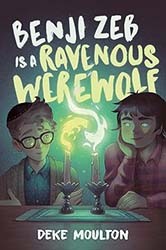As popular as the vampire novel has become for young readers, Don’t Want to Be Your Monster proves that there are still dimensions of this genre to be explored.
Deke Moulton points out in their insightful author’s note that alleged Jewish traits have always hovered over vampire stories, from folklore to Bram Stoker’s Dracula. This can be traced back to the infamous blood libel, a conspiracy that held that Jews consumed Christian blood and that resulted in violence against them. More broadly, the lie that Jews controlled the world financially and manipulated non-Jews made it easy to associate Jews with treacherous monsters.
When Adam and Victor, two foster brothers, are confronted with a series of crimes, they must balance handling the normal stresses of their family life with finding the killer. The boys’ mothers are both loving and supportive, and they share the anxieties of all parents who are trying to prepare their children to survive and thrive. Mom and Mama have sheltered a series of kids, but Adam has a particularly unique origin story. During an antisemitic incident at a synagogue, Mom saved him through a bite that transformed him from an ordinary mortal to a vampire. Adam admires Victor, his older brother, but Victor seems increasingly distant; he feels constricted by their stable home. It becomes clear that drinking blood does not spare anyone from the pains of growing up.
The novel’s vampire lore is not gimmicky, although it is intriguing to hear a mother warn her son not to get caught in the sunlight, or to learn that, given their “hemavore” diet, vampires don’t need dishes. The coexistence of familiar and unfamiliar aspects of the characters’ lives reinforces the idea that people share common experiences but also have distinctive traits. Groups with different qualities should not be alienated from others.
When Adam meets Shoshana and Luis, two humans equally obsessed with solving crime, he enters into a dialogue with them about how some differences can be obstacles to mutual acceptance. Shoshana is knowledgeable about both Jews and vampires, and she knows that ignorance can lead to hatred.
By the novel’s conclusion, not every relationship has been healed, but there are conditions in place for healing to happen. No one, Moulton assures us, has to live as someone else’s monster. Readers will also learn the proper bracha to recite upon seeing a vampire.
Emily Schneider writes about literature, feminism, and culture for Tablet, The Forward, The Horn Book, and other publications, and writes about children’s books on her blog. She has a Ph.D. in Romance Languages and Literatures.





